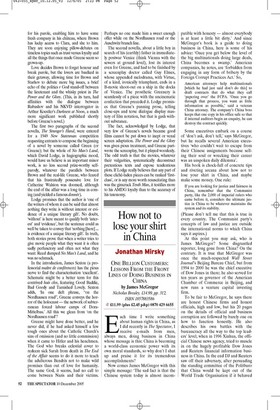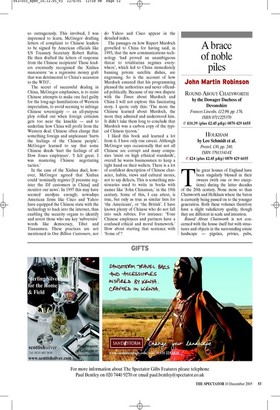How not to lose your shirt in China
Jonathan Mirsky
ONE BILLION CUSTOMERS: LESSONS FROM THE FRONT LINES OF DOING BUSINESS IN CHINA by James McGregor Nicholas Brealey, £14.99, pp. 312, ISBN 1857883586 ✆ £11.99 (plus £2.45 p&p) 0870 429 6655 Each time I write something about human rights in China, as I did recently in The Spectator, I receive e-mails from men, always men, doing business in China whose message is this: China is becoming a world-class economic power with its own moral standards, so why don’t I shut up and praise it for its tremendous accomplishments?
Now comes James McGregor with this simple message: ‘The sad fact is that the Chinese system today is almost incom patible with honesty — almost everybody is at least a little bit dirty.’ And since McGregor’s book is a guide to doing business in China, here is some of his advice: ‘Once you get below the level of the big multinationals doing large deals, China becomes a swamp.’ American companies, he notes, are ‘forbidden from engaging in any form of bribery by the Foreign Corrupt Practices Act.’ So,
American attorneys help multinationals [which he had just said don’t do this] to draft contracts that do what they call ‘papering over’ the FCPA. ‘Once you go through that process, you want as little information as possible,’ said a veteran China attorney. The company’s China boss keeps that one copy in his office safe so that if internal auditors begin an enquiry, he can destroy the contract quickly.
Some executives embark on a course of ‘don’t ask, don’t tell,’ says McGregor, but he recalls several American executives ‘who couldn’t wait to escape from their Chinese assignments because selling their soul or wrecking their career was an unspoken daily dilemma’.
His book is chock-full of concrete tips and riveting arcana about how not to lose your shirt in China, and maybe make some money. One rule:
If you are looking for justice and fairness in China, remember that the Communist party, like the 2,000 of imperial rulers who came before it, considers the ultimate justice in China to be whatever maintains the system and its stability.
(Please don’t tell me that this is true in every country. The Communist party’s concepts of law and justice are outside the international norms to which China says it aspires.) At this point you may ask, who is James McGregor? Some disgruntled reporter, long gone from China? On the contrary. It is true that McGregor was once the much-respected Wall Street Journal’s Beijing Bureau Chief, but from 1994 to 2000 he was the chief executive of Dow Jones in there; he also served for ten years as governor of the American Chamber of Commerce in Beijing, and now runs a venture capital investing firm.
To be fair to McGregor, he says there are honest Chinese firms and honest officials, high and low, but his 20 pages on the details of official and business corruption are followed by barely one on how to function honestly. He also describes his own battles with the bureaucracy all the way to the top leaders’ level, when in 1996 Xinhua, the official Chinese news agency, tried to muscle in on the hugely profitable Dow Jones and Reuters financial information business in China. In the end DJ and Reuters saw off their adversary, after persuading the standing committee of the Politburo that China would be kept out of the World Trade Organisation if it behaved so outrageously. This involved, I was impressed to learn, McGregor drafting letters of complaint to Chinese leaders to be signed by American officials like US Treasury Secretary Robert Rubin. He then drafted the letters of response from the Chinese recipients! These leaders eventually recognised the Xinhua manoeuvre ‘as a regressive money grab that was detrimental to China’s accession to the WTO’.
The secret of successful dealing in China, McGregor emphasises, is to resist Chinese attempts to make one feel guilty for the long-ago humiliations of Western imperialism, to avoid seeming to infringe Chinese sovereignty — an all-purpose ploy rolled out when foreign criticism gets too near the knuckle — and to underline how China will profit from the Western deal. Chinese often charge that something foreign and unpleasant ‘hurts the feelings of the Chinese people’. McGregor learned to say that some Chinese deeds ‘hurt the feelings of all Dow Jones employees’. ‘I felt great. I was mastering Chinese negotiating tactics.’ In the case of the Xinhua duel, however, McGregor agreed that Xinhua could ‘nominally register [I presume register the DJ customers in China] and monitor our news’. In 1997 this may have seemed anodyne enough; nowadays American firms like Cisco and Yahoo have equipped the Chinese state with the technology to hack into the internet, thus enabling the security organs to identify and arrest those who use key ‘subversive’ words like democracy, Tibet and Tiananmen. These practices are not mentioned in One Billion Customers, nor do Yahoo and Cisco appear in the detailed index.
The passages on how Rupert Murdoch grovelled to China for having said, in 1993, that the new communications technology ‘had proved an unambiguous threat to totalitarian regimes everywhere’, which led to China immediately banning private satellite dishes, are engrossing. So is the account of how Murdoch ensured that his programming pleased the authorities and never offended politically. Because of my own dispute with the Times about Murdoch and China I will not explore this fascinating story. I quote only this: ‘The more the Chinese learned about Murdoch, the more they admired and understood him. It didn’t take them long to conclude that Murdoch was a carbon copy of the typical Chinese tycoon.’ I liked this book and learned a lot from it. I have only one caveat. Although McGregor says occasionally that not all Chinese are corrupt and many companies ‘insist on high ethnical standards’, overall he warns businessmen to keep a tight hand on their wallets. There is a lot of confident description of Chinese character, habits, views and cultural mores, not to say defects. This is something missionaries used to write in books with names like ‘John Chinaman,’ in the 19th century. Some of this, I can attest, is true, but only as true as similar lists for ‘the Americans’, or ‘the British’. I have known plenty of Chinese who do not fall into such rubrics. For instance: ‘Your Chinese employees and partners have a confused ethical and moral framework.’ How about starting that sentence with ‘Some of’?


























































 Previous page
Previous page